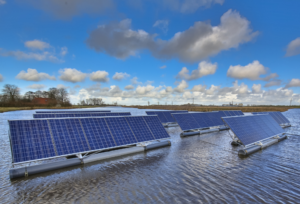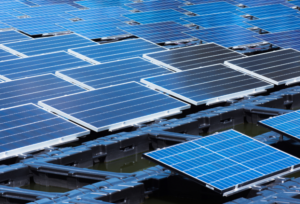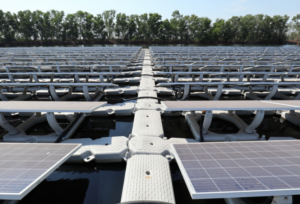North Carolina Aquarium at Fort Fisher Floats Innovative Idea for a Floating Solar+Storage System
 The North Carolina Clean Energy Technology Center (NCCETC) at NC State University is working with the NC Aquarium at Fort Fisher to evaluate the feasibility of an innovative solar plus energy storage installation to improve both the sustainability and the resiliency of the aquarium. The proposed design concept has a unique feature: the solar installation will float on top of a pond located behind the Fort Fisher Aquarium, taking advantage of underutilized land while allowing for cooling of the solar panels which improves efficiency.
The North Carolina Clean Energy Technology Center (NCCETC) at NC State University is working with the NC Aquarium at Fort Fisher to evaluate the feasibility of an innovative solar plus energy storage installation to improve both the sustainability and the resiliency of the aquarium. The proposed design concept has a unique feature: the solar installation will float on top of a pond located behind the Fort Fisher Aquarium, taking advantage of underutilized land while allowing for cooling of the solar panels which improves efficiency.
 The Aquarium at Fort Fisher first partnered with NCCETC after receiving a grant from the NC Aquarium Sustainability Fund. “The aquarium and our staff are committed to a more sustainable future and being leaders in our community,” shared Hap Fatzinger, Director of the North Carolina Aquarium at Fort Fisher. “The partnership with NCCETC has revealed incredible opportunities for our facility, our animals, and our community.”
The Aquarium at Fort Fisher first partnered with NCCETC after receiving a grant from the NC Aquarium Sustainability Fund. “The aquarium and our staff are committed to a more sustainable future and being leaders in our community,” shared Hap Fatzinger, Director of the North Carolina Aquarium at Fort Fisher. “The partnership with NCCETC has revealed incredible opportunities for our facility, our animals, and our community.”
 While floating solar is still a newer technology, it’s not new to North Carolina- the military base on Fort Bragg is home to the state’s first floating solar installation, completed May 2022. The Center for Applied Aquatic Ecology is also assisting NCCETC and the NC Aquarium at Fort Fisher as a research partner to help build on the body of knowledge about this emerging technology and contribute to best practices in design and installation.
While floating solar is still a newer technology, it’s not new to North Carolina- the military base on Fort Bragg is home to the state’s first floating solar installation, completed May 2022. The Center for Applied Aquatic Ecology is also assisting NCCETC and the NC Aquarium at Fort Fisher as a research partner to help build on the body of knowledge about this emerging technology and contribute to best practices in design and installation.
Staff from NCCETC’s Clean Power & Industrial Efficiency program conducted a technical and financial feasibility analysis to assess the potential for solar photovoltaic (PV) based on the space available. They evaluated the best locations for a solar installation, including rooftop, parking lot canopies, and floating solar while considering a range of sizes to optimize the system’s energy performance and financial payback.
 The combination of floating solar with battery electric storage modeled by NCCETC would provide 24 percent of the facility’s energy consumption, educational opportunities, water quality benefits, research opportunities, heat island reduction, and resiliency in the face of increasing storm events. The pond at the NC Aquarium at Fort Fisher will be one of the many features visible from a new four-story rooftop deck currently in design by architect Szostak Design, meaning the Aquarium’s more than 450,000 annual visitors will be able to see the new floating solar installation from a new vantage point. This would be accompanied by a new exhibit about climate change mitigation and the importance of energy resiliency in the face of more extreme weather.
The combination of floating solar with battery electric storage modeled by NCCETC would provide 24 percent of the facility’s energy consumption, educational opportunities, water quality benefits, research opportunities, heat island reduction, and resiliency in the face of increasing storm events. The pond at the NC Aquarium at Fort Fisher will be one of the many features visible from a new four-story rooftop deck currently in design by architect Szostak Design, meaning the Aquarium’s more than 450,000 annual visitors will be able to see the new floating solar installation from a new vantage point. This would be accompanied by a new exhibit about climate change mitigation and the importance of energy resiliency in the face of more extreme weather.
Executive Order 80, signed in October 2018 by Governor Roy Cooper, requires state agencies to reduce statewide greenhouse gas emissions to 40 percent% below 2005 levels by 2025. As part of the NC Department of Natural and Cultural Resources, the Fort Fisher Aquarium is subject to this commitment. Additionally, the North Carolina Aquariums have joined with other members of the national Aquarium Conservation Partnership to achieve climate neutrality by 2040.
A system installed as a functional solar PV and energy storage demonstration would include not only financial and resiliency benefits, but also unique research and educational opportunities for the Aquarium and its visitors. Senior Project Manager at NCCETC, Elizabeth Bowen, explained that early research has shown that floating solar installations can reduce algae blooms, which is of interest for the NC Aquarium at Fort Fisher, since algae can be detrimental and even fatal to the fish living in an ecosystem.
 The Center for Applied Aquatic Ecology will be collecting data before, during and after the floating solar installation to conduct relevant research regarding floating solar impact on water quality. If the floating solar panels can mitigate potential algal blooms in the pond, the pond has the potential to be an educational tool for visitors, as well as provide research opportunities for advanced undergraduate students, graduate students and postdoctoral fellows interested in continuing the advancement of research of toxic algae.
The Center for Applied Aquatic Ecology will be collecting data before, during and after the floating solar installation to conduct relevant research regarding floating solar impact on water quality. If the floating solar panels can mitigate potential algal blooms in the pond, the pond has the potential to be an educational tool for visitors, as well as provide research opportunities for advanced undergraduate students, graduate students and postdoctoral fellows interested in continuing the advancement of research of toxic algae.
Fortifying Resiliency & Sustainability
 For a coastal aquarium housing over 4,000 animals on a barrier island, planning for electric resiliency is imperative for the future. In the New Orleans Aquarium of the Americas, during Hurricane Katrina, the vast majority of the aquarium animals perished due to the loss of electricity. It is expected that the intensity and frequency of storms will increase with climate change, and the possibility that Fort Fisher will face an extreme storm within the next 10 years is significant.
For a coastal aquarium housing over 4,000 animals on a barrier island, planning for electric resiliency is imperative for the future. In the New Orleans Aquarium of the Americas, during Hurricane Katrina, the vast majority of the aquarium animals perished due to the loss of electricity. It is expected that the intensity and frequency of storms will increase with climate change, and the possibility that Fort Fisher will face an extreme storm within the next 10 years is significant.
“Solar plus battery-based electric storage would extend the aquarium’s resilience beyond what their existing diesel generator equipment currently provide,” Bowen said. “The battery system would work together with the diesel backup generation to improve energy resiliency, reducing diesel consumption by an estimated 32 percent for an 8-day outage period.”
Diesel generators are dependent on fuel delivery, making them vulnerable to critical threats such as high wind and flooding that can make roadways impassable and fuel deliveries challenging. With the addition of the proposed 487 kilowatt floating solar installation paired with a 100kW/3-hour battery system, the site could withstand an additional four days of outage as compared with using the diesel generator equipment alone.
The feasibility assessment from NCCETC also identified applicable financing options and initial donor interest to support the aquarium’s expansion as well as research for ethical sourcing of the solar equipment. In the future, NCCETC will continue to assist the Aquarium at Fort Fisher with establishing research and funding partners as the project develops.